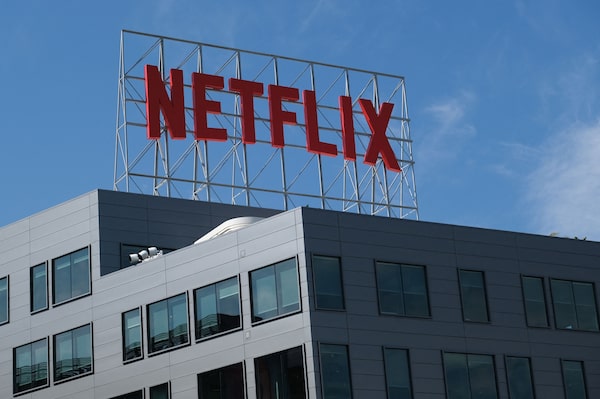
The Netflix logo is displayed on top of the company's office building in Hollywood, Calif., on March 2.CHRIS DELMAS/AFP/Getty Images
Netflix Inc. NFLX-Q soared during the pandemic as people flocked to the video-streaming giant to occupy themselves at home amid widespread public-health restrictions. But now that much of the world has reopened, Netflix has staged a reversal of fortune.
The company forecasted a loss of two million subscribers Tuesday in the second quarter this year, on top of a loss of 200,000 subscribers in the first quarter – its first drop in 10 years. Shares in Netflix plunged 35 per cent on the news Wednesday, erasing about US$54-billion in market value.
It’s a sharp contrast from the past two years, when tens of millions of viewers signed up with the streaming service during the pandemic to catch hits such as Outer Banks, The Queen’s Gambit and Squid Game.
Netflix shares plummet 35% as investors skeptical of plans to crack down on account sharing
Today, however, Netflix is facing a number of headwinds. The company partly blamed its declining subscriber count on password sharing, where people watch the service using someone else’s account, and said it’s working to address the problem.
In addition, some customers have balked at successive price increases in recent years. And competing services offered by Disney, Amazon, Paramount and others are racking up customers with different content and pricing. Netflix also lost 700,000 subscribers in March as it shut down its service in Russia over the invasion of Ukraine.
Netflix said it’s taking steps to address its problems, such as working on a lower-cost ad-supported option. However, the streaming service didn’t provide any details about how such a service would work or how much it would cost. Another rival, Hulu, has long offered an ad-supported tier.
For some Netflix customers, the problem is simply a lack of engaging shows. Toronto resident Ryan Chatterjee, 28, said he cancelled his subscription in March, 2021, after one year of having a basic membership plan. Prior to that, he was sharing his former roommate’s account for a year.
“The content there wasn’t very good,” Mr. Chatterjee said. “A lot of the Netflix original stuff just isn’t for my taste. I always look at reviews, too … because I don’t want to waste hours of my life, then realize it’s bad.”
Louis-Etienne Dubois, professor of creative industries management at Ryerson University, said the subscriber losses so far aren’t a major problem, given Netflix’s global total of nearly 222 million paying customers in more than 190 countries. What is concerning, however, is the downward trend.
In recent years, Netflix’s “growth came at a time where all the competitors weren’t really there or operating at the same scale as today,” Prof. Dubois said. “But now they’re seeing many other competitors.”
Richard Powers, associate professor at the University of Toronto’s Rotman School of Management, said there is also a degree of saturation in the North American market. Netflix’s subscriber count in Canada and the U.S. has been static for several quarters.
Netflix, however, still has many loyal customers.
Ottawa resident Mickey Roy, for example, has had a premium membership with Netflix for five years.
“Why would anyone dump it? My 88-year-old father-in-law that lives with us loves the variety of Netflix and it keeps him entertained,” Mr. Roy said. “I consider what I’m paying to be a decent price for 365-day entertainment. It’s worth every penny.”
Echoing Mr. Roy’s sentiments is Christopher Robin Lai of Stouffville, Ont. “There are now two other streaming services I have purchased but to be honest I keep going back to Netflix because of the variety and the Netflix Originals. It’s still the king of streaming in my opinion.
“My brother bought a Netflix account years ago,” Mr. Lai added, “and ever since, I mooch off of him.”
When it comes to password sharing, Prof. Powers, who has a standard plan, says Netflix has structured its service to accommodate sharing.
“So you can’t have it both ways,” he said. “Any attempt to limit sharing will encourage people to jump to other services.”
“The password-sharing problem is more of a side story,” Prof. Dubois added. “It might look extensive to them, but it’s about cracking down to get a few dollars here and there. This isn’t growth. I can’t think of a business model that implies growth through disciplining its users.”
The key to improvement for Netflix is getting past being a one-trick pony, Prof. Dubois said, and perhaps expanding into video games, music, podcasts or other entertainment.
“If you look at Apple or Disney, they still have theme parks and computers. Netflix doesn’t have another business to fall back on.”
With a report from the Associated Press
Your time is valuable. Have the Top Business Headlines newsletter conveniently delivered to your inbox in the morning or evening. Sign up today.